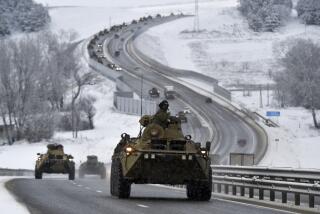Our Ounce of Prevention Saves the Allies Billions : Burden-sharing: Compared with the benefits of oil peace, contributions promised by Japan, Germany and others hardly make a down payment.
- Share via
Although Japan and Germany are two of biggest beneficiaries of the American military buildup in the Persian Gulf, both seek to shirk their fair share of the costs. After vacillating, the Japanese government first pledged a symbolic $1 billion but waffled on what it intended to count. In response to sharp criticism, Japan has now doubled its pledge, but is still short on specifics. Similarly, last week Germany just said no. A senior government official explained that because the military deployment was primarily American, “it should be paid for by one nation.” Sen. Sam Nunn expressed the annoyance of a growing chorus of Americans when he called these responses “absolutely ridiculous.”
As the United States conducts the most massive, rapid movement of military power in history, it is not surprising that Americans are asking more pointedly: Whose interests are threatened by Iraq’s seizure of Kuwait and its threat to Saudi Arabia? Who should pay to protect these interests, and how much?
There are no established criteria for answering these questions. How can we estimate the value to the international order if Hussein’s blatant military aggression succeeds, alternatively, if the West is successful in resisting? One dimension of the threat, however, can be readily estimated. That is the cost of oil.
If we calculate the difference between what the price of oil would have been without the American military response, and what the price will be now, we have a measure of the direct economic benefits to the consuming countries. Before the Iraqi invasion, the price of oil was about $20 per barrel. The Organization of Petroleum Exporting Countries sought to increase the price to $22. Today, oil is near $30. If the presence of American and other forces leads Iraq to comply with the U.N. resolution and withdraw from Kuwait, oil is likely to fall back to $20.
What would the price of oil have been without the U.S. military guarantee to Saudi Arabia and the economic-military embargo? If Hussein’s hostile takeover of Kuwait had succeeded, he would have so intimidated his Arab brethren that he could have dictated OPEC’s price. A price of $50 or more would not have been unthinkable. After all, in today’s dollars, this is what happened in 1979 and 1980 with a much smaller interruption of the oil market.
In estimating economic costs of such increases, a useful rule of thumb says that for each $1 increase in the price of a barrel of oil, the annual oil import bill of consuming countries rises $7 billion. Furthermore, an oil-price shock would have a much larger impact on economic output through inflation and recession. Eventually, conservation would reduce demand and alternative supplies would force prices down, but the transitions have been very costly.
Economists argue about competing estimates. But if we take the conservative assumption that prices set by Saddam Hussein would have produced only a repetition of the experience after the price jump in 1979, we have a lower boundary.
As the evidence shows, the economic stakes for all oil importers are measured in hundreds of billions of dollars, dwarfing the costs of prevention. The troops in Saudi Arabia are helping Japan save nearly $150 billion on its oil bill, and still more in lost economic output. West Germany’s savings are equal to projected costs of reconstructing East Germany. The price tag for the four-year economic adjustment by the developed world after the 1979 oil shock was $1.5 trillion. When compared with the benefits of oil peace, contributions of a paltry $2 billion hardly counts as a serious down payment.
Americans and others are spending dollars and risking blood to prevent these--among other--consequences. Here we have a rare case in which some economic interests are readily identified and estimated. The performance of statesmen in Japan, Germany and elsewhere in sharing the common burden and persuading their publics that it is in their interests to do so will prove a critical indicator of the prospects for the post-Cold War international order.
More to Read
Sign up for Essential California
The most important California stories and recommendations in your inbox every morning.
You may occasionally receive promotional content from the Los Angeles Times.










